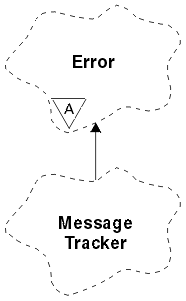ImqMessageTracker C++ class
This class encapsulates those attributes of an ImqMessage or ImqQueue object that can be associated with either object.

This class relates to the MQI calls listed in ImqMessageTracker cross-reference.
Object attributes
- accounting token
- A binary value (MQBYTE32) of length MQ_ACCOUNTING_TOKEN_LENGTH. The initial value is MQACT_NONE.
- correlation id
- A binary value (MQBYTE24) of length MQ_CORREL_ID_LENGTH that you assign to correlate messages. The initial value is MQCI_NONE. The additional value, MQCI_NEW_SESSION, is possible.
- feedback
- Feedback information to be sent with a message. The initial value is MQFB_NONE. The following additional values are possible:
- MQFB_SYSTEM_FIRST
- MQFB_SYSTEM_LAST
- MQFB_APPL_FIRST
- MQFB_APPL_LAST
- MQFB_COA
- MQFB_COD
- MQFB_EXPIRATION
- MQFB_PAN
- MQFB_NAN
- MQFB_QUIT
- MQFB_DATA_LENGTH_ZERO
- MQFB_DATA_LENGTH_NEGATIVE
- MQFB_DATA_LENGTH_TOO_BIG
- MQFB_BUFFER_OVERFLOW
- MQFB_LENGTH_OFF_BY_ONE
- MQFB_IIH_ERROR
- MQFB_NOT_AUTHORIZED_FOR_IMS
- MQFB_IMS_ERROR
- MQFB_IMS_FIRST
- MQFB_IMS_LAST
- MQFB_CICS _APPL_ABENDED
- MQFB_CICS_APPL_NOT_STARTED
- MQFB_CICS_BRIDGE_FAILURE
- MQFB_CICS_CCSID_ERROR
- MQFB_CICS_CIH_ERROR
- MQFB_CICS_COMMAREA_ERROR
- MQFB_CICS_CORREL_ID_ERROR
- MQFB_CICS_DLQ_ERROR
- MQFB_CICS_ENCODING_ERROR
- MQFB_CICS_INTERNAL_ERROR
- MQFB_CICS_NOT_AUTHORIZED
- MQFB_CICS_UOW_BACKED_OUT
- MQFB_CICS_UOW_ERROR
We can also use an application-specific string of our choice. For more information about this, see the Feedback (MQLONG) field of the message descriptor (MQMD).
- group id
- A binary value (MQBYTE24) of length MQ_GROUP_ID_LENGTH unique within a queue. The initial value is MQGI_NONE.
- message id
- A binary value (MQBYTE24) of length MQ_MSG_ID_LENGTH unique within a queue. The initial value is MQMI_NONE.
Constructors
- ImqMessageTracker( );
- The default constructor.
- ImqMessageTracker( const ImqMessageTracker & tracker );
- The copy constructor. See the operator = method for details.
Object methods (public)
- void operator = ( const ImqMessageTracker & tracker );
- Copies instance data from tracker, replacing the existing instance data.
- ImqBinary accountingToken ( ) const ;
- Returns a copy of the accounting token.
- ImqBoolean setAccountingToken ( const ImqBinary & token );
- Sets the accounting token. The data length of token must be either zero or MQ_ACCOUNTING_TOKEN_LENGTH. This method returns TRUE if successful.
- void setAccountingToken ( const MQBYTE32 token = 0 );
- Sets the accounting token. token can be zero, which is the same as specifying MQACT_NONE. If token is nonzero, it must address MQ_ACCOUNTING_TOKEN_LENGTH bytes of binary data. When using predefined values such as MQACT_NONE, you might need to make a cast to ensure a signature match; for example, (MQBYTE *)MQACT_NONE.
- ImqBinary correlationId ( ) const ;
- Returns a copy of the correlation id.
- ImqBoolean setCorrelationId ( const ImqBinary & token );
- Sets the correlation id. The data length of token must be either zero or MQ_CORREL_ID_LENGTH. This method returns TRUE if successful.
- void setCorrelationId ( const MQBYTE24 id = 0 );
- Sets the correlation id. id can be zero, which is the same as specifying MQCI_NONE. If id is nonzero, it must address MQ_CORREL_ID_LENGTH bytes of binary data. When using predefined values such as MQCI_NONE, you might need to make a cast to ensure a signature match; for example, (MQBYTE *)MQCI_NONE.
- MQLONG feedback ( ) const ;
- Returns the feedback.
- void setFeedback ( const MQLONG feedback );
- Sets the feedback.
- ImqBinary groupId ( ) const ;
- Returns a copy of the group id.
- ImqBoolean setGroupId ( const ImqBinary & token );
- Sets the group id. The data length of token must be either zero or MQ_GROUP_ID_LENGTH. This method returns TRUE if successful.
- void setGroupId ( const MQBYTE24 id = 0 );
- Sets the group id. id can be zero, which is the same as specifying MQGI_NONE. If id is nonzero, it must address MQ_GROUP_ID_LENGTH bytes of binary data. When using predefined values such as MQGI_NONE, you might need to make a cast to ensure a signature match, for example (MQBYTE *)MQGI_NONE.
- ImqBinary messageId ( ) const ;
- Returns a copy of the message id.
- ImqBoolean setMessageId ( const ImqBinary & token );
- Sets the message id. The data length of token must be either zero or MQ_MSG_ID_LENGTH. This method returns TRUE if successful.
- void setMessageId ( const MQBYTE24 id = 0 );
- Sets the message id. id can be zero, which is the same as specifying MQMI_NONE. If id is nonzero, it must address MQ_MSG_ID_LENGTH bytes of binary data. When using predefined values such as MQMI_NONE, you might need to make a cast to ensure a signature match, for example (MQBYTE *)MQMI_NONE.
Reason codes
- MQRC_BINARY_DATA_LENGTH_ERROR
Parent topic: IBM MQ C++ classes